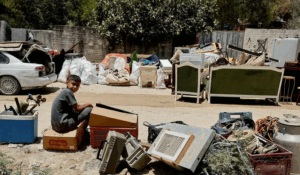IDF starts demolishing 100 Palestinian homes in West Bank as High Court blocks four

Palestinian child displaced from his home in Tulkarm refugee camp, July 2025
Hagar Shezaf reports in Haaretz on 8 July 2025:
The Israeli army began demolishing houses in the Tulkarm refugee camp on Monday to widen access roads in the camp, but announced that it would reexamine whether to demolish four houses following an expert opinion filed with the High Court.
The Israel Defense Forces made the decision following a petition for an injunction against the demolition filed by Adalah – The Legal Center for Arab Minority Rights in Israel with the High Court last week.
The 11 Palestinian appellants who live in the four houses argued that the houses are located next to open areas and there is no need to demolish them in order to widen the roads. They based their claim on an expert opinion written by Assaf Peled, a city planner from Bimkom – Planners for Planning Rights. The appellants, represented by Adv. Suhad Bishara stated that overall, the 104 houses the IDF slated for demolition in Tulkarm comprise approximately 400 apartments.
On Friday, a Supreme Court justice ruled that the state should refrain from demolishing the 104 buildings in the Tulkarm refugee camp that are the subjects of the petition at this time “Subject to urgent operational or clear security needs.” On Sunday, the army announced that, except for the four buildings included in the opinion, the demolition of the other houses would begin due to a “clear and immediate military need.”
In the response, the army wrote that delaying the razing would prevent the possibility of carrying out the demolitions. Although the refugee camp had been largely emptied of inhabitants, the IDF claimed that forces still encountered explosive devices. The court did not object to demolishing the 100 houses that were not mentioned in the expert opinion, and the demolitions later began.
Adalah stated that the army’s response to the court indicates that there is no urgent combat need requiring immediate demolition, as the army also acknowledges that there is no active combat occurring in the camp. The human rights organization added that the state’s position thwarts any possibility of a substantive hearing before the court.
“The results of the demolition are drastic and life-changing for all the protected residents and homeowners,” Adalah wrote. They listed loss of home and employment, destruction of their business and forced removal for an undetermined duration as consequences of the demolitions.
This is the first time that the court ordered the delay of home demolitions in a West Bank refugee camp since Operation Iron Wall began in January.
The Jenin, Tulkarm and Nur Shams refugee camps were almost entirely deserted as a result of military operations. During Operation Iron Wall, the IDF began demolishing dozens of buildings in the camps to widen the roads and reshape the camps, as the army utilizes them for military posts.
Several petitions have been filed in recent months against the demolitions; however, after they were dismissed, the demolitions went ahead.
This article is reproduced in its entirety
